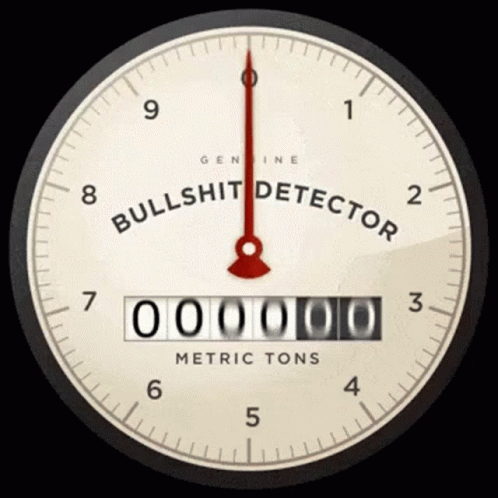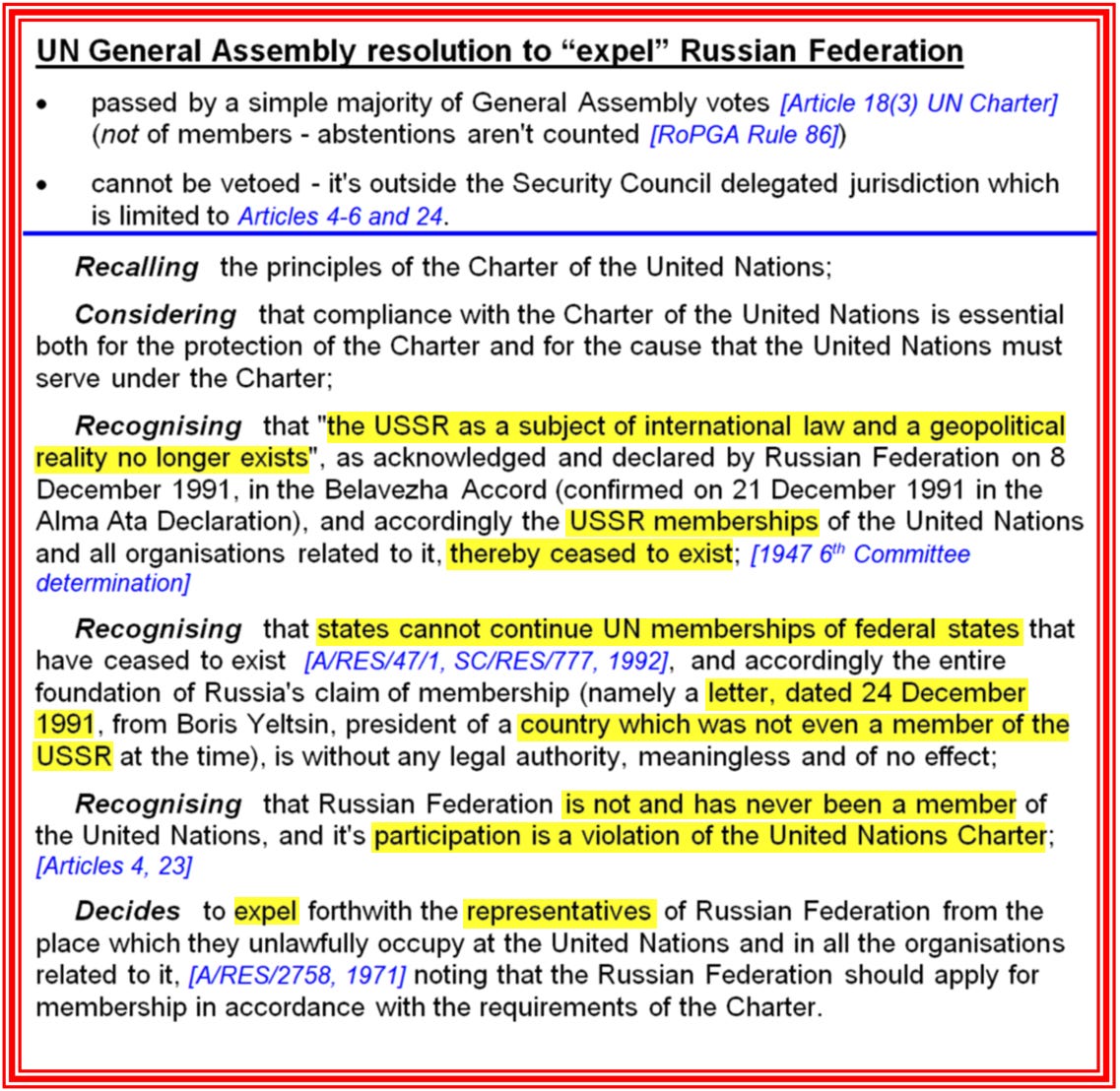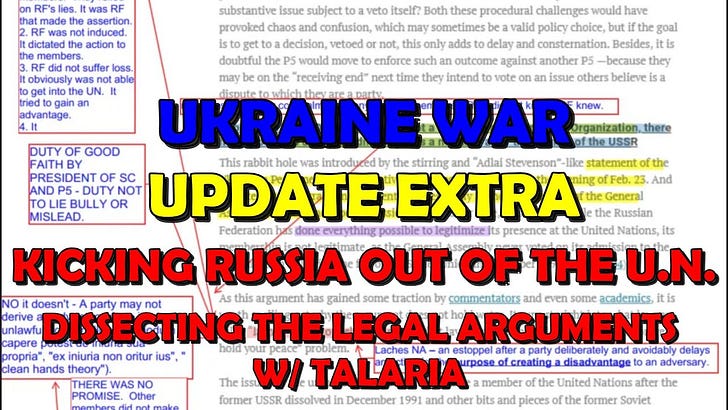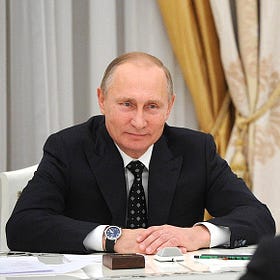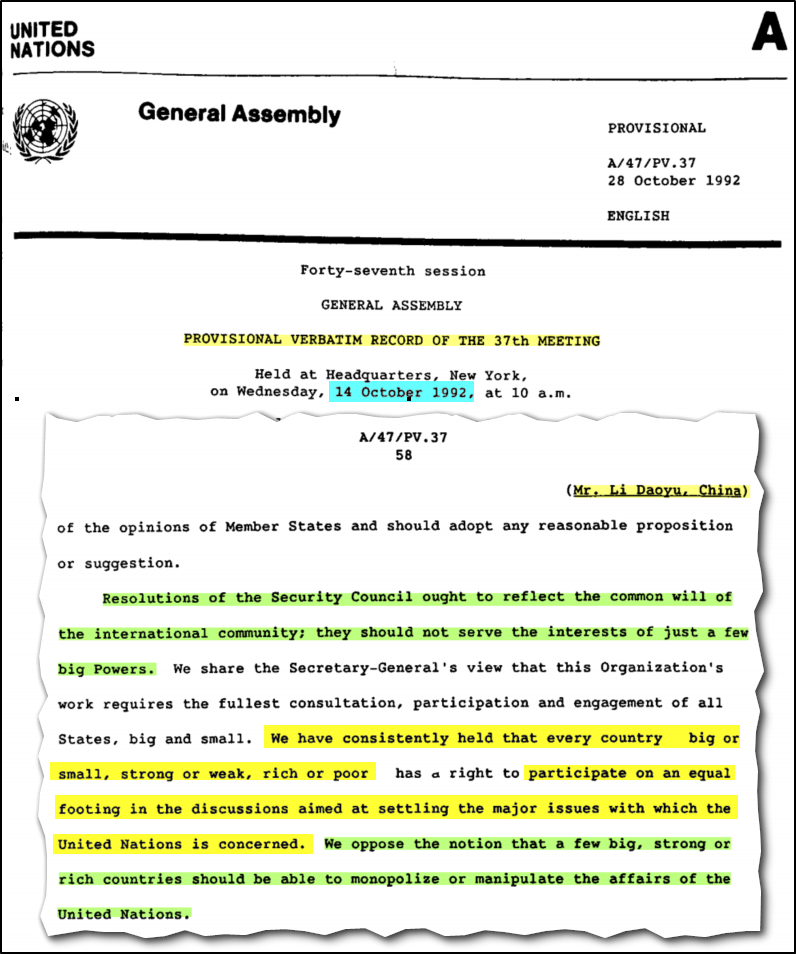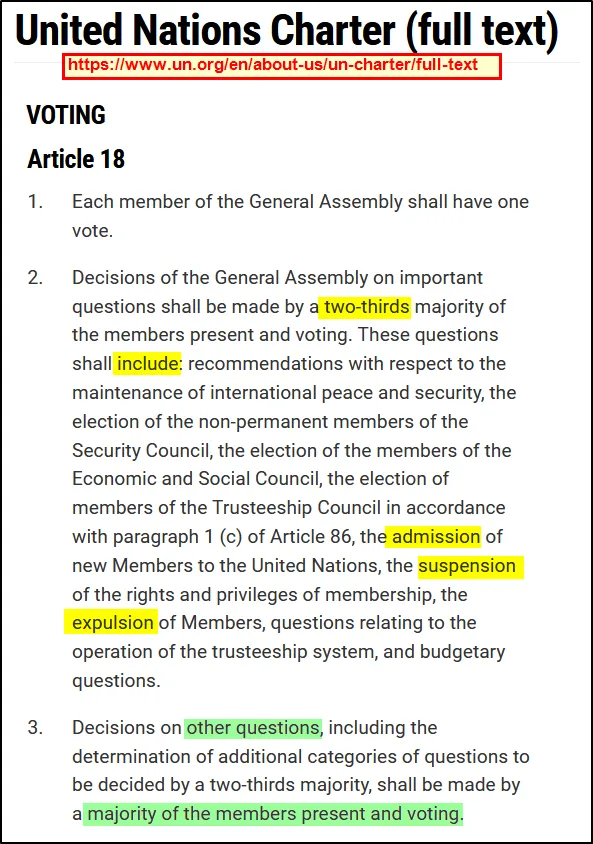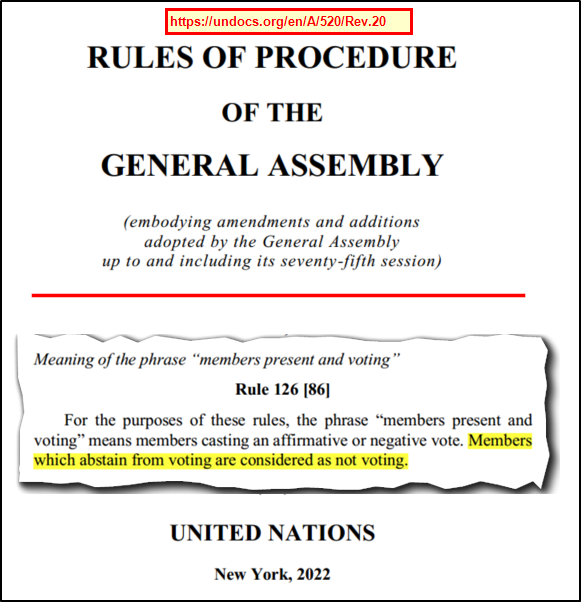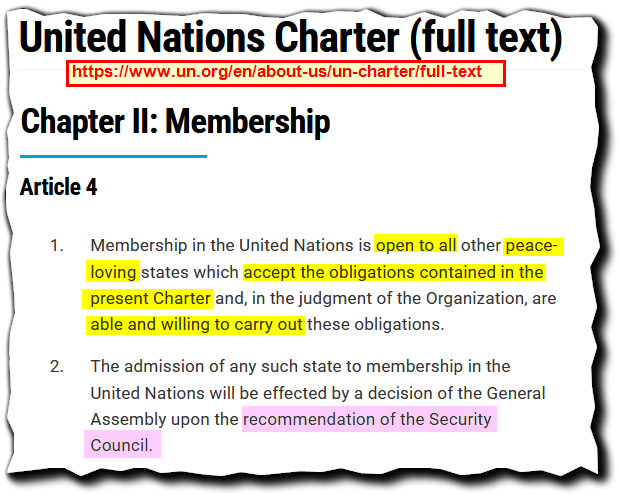What's wrong with the United Nations, and how to fix it - Knowledge is Power
Spoiler: 1 simple General Assembly resolution to comply with the Charter will fix it for now, 1 minor amendment to future-proof it. To end dominance by aggressive nuke powers and embed democracy.
What is the United Nations and why is it important?
Our UN is simply our governments, the governments of all peace-loving nations, working collectively together to maintain international peace and protect human rights.
It is the world’s most powerful military alliance. And much more.
It was created in 1945 by a treaty between 51 peace-loving countries (the United Nations Charter and Statute of the International Court of Justice). Every country in the world has joined it and agreed to the Charter, except the Russian Federation, and a few disputed territories such as Taiwan and Western Sahara (claimed by other countries), and Palestine (blocked for political reasons: it is unwilling or unable to comply with obligations of non-aggression under the Charter).
The United Nations was created to end the 1000+ years of imperialism - domination of people by violence.
Our United Nations created and maintains the world as we know it and take for granted. It created universal human rights, and independent self-governance by people in countries defined by commonalities of people (“sovereignty), rather than by invasion and control by tyrants. It created the security and permanency of borders (“territorial integrity”). It created rule by law instead of by conquest, internationally (the rule of law).
A functioning UN acts as a unified impartial international police force, focused on enforcing the law: protecting peace, human rights, and sovereignty.
It allows governments to rapidly consult, decide, and act in as little as 24 hours.
It enables pooling of resources for coordinated and affordable international action.
It unites the power of the whole world in enforcement such as sanctions, blockades, force deployment, and negotiations.
Effective deterrence mostly removes the need for military interventions.
It prevents individual states from exploiting conflicts and victims for their own gain.
It ensures aggressors cannot evade consequences by manipulating individual leaders.
Policies remain consistent and can be implemented long term, guided by the rules of the UN Charter regardless of changes in individual governments.
The combination of human rights and self-determination enabled the spread of democracy - the rule of countries by their people, rather than despots who wrested power by subjugating the people. And vice versa. A good circle.
As a result over a hundred countries have been freed from colonialism/imperialism and have achieved self-rule, most by democracy. 66 “not free” countries of the world, ravaged by violations of human rights, wars, and the poverty engendered by them, have been mostly influenced and manipulated by external bad actors, in violation of the Charter.
To look at what the world would be like without the UN Charter, look no further than Sudan, and Syria during the Assad regime - where the Russian Federation vetoed UN intervention. And Russia itself - an imperial nation whose own population lives in poverty and oppression, where around one out of 5 ordinary male humans are forced to fight and die in obscenely cruel, “meat grinder” conditions.
What is the United Nations Charter? The Charter is a document that created the United Nations and defines its structure, purpose, powers and duties, and the rights and obligations of its members. You can read the Charter on the UN web site, https://www.un.org/.
The UN has no power to act against or outside its Charter.
What is wrong?
The United Nations has failed to carry out it’s core duty, the suppression of acts of aggression and peaceful settlement of international disputes, in every single case in memory.
Voices, including the corrupt Secretary-General, claim that it is incapable of performing its role and that it must be “reformed”.
(This is Russia’s greatest dream: to discredit and disempower the UN, and cover up it’s own fraud - that it is participating when it has never been a member.
Of course, no “reform” of the UN is possible while it is pretending that Russia has a veto, without Russia’s demands being met. That would include Russia being given the Permanent Membership of the Security Council and veto which it does not have. Legitimising a 34 year old fraud, and giving Russia the ability to violate the Charter by vetoing any action to stop it, weakening the United Nations forever.)
Actually the UN is a very soundly designed and functional organisation. It just needs a couple of tweaks.
Concomitantly, there is a constant clamour from other power-seeking states demanding to be made permanent members of the Security Council, with power to veto actions by the United Nations.
Mutually inconsistent propositions.
The veto was designed as a protection of the 5 big powers’ interests, but it also operates as a safety mechanism to prevent rogue actions by a stacked Security Council. It relates mostly to the Security Council’s function of actions for maintenance of international peace and security - in other words, intervention in violence.
The effect of adding more vetos will be more inaction, bringing the UN to a complete standstill.
The core problem is that, despite the law in Article 24 of the UN Charter that the Security Council must act in accordance with the purposes and principles of the Charter, it is constantly violated due to bad faith actors. The main one is Russia which is engaged in extreme aggression and has used the veto to do so with impunity, and protect other corrupt states doing so. The other members have done so less often.
Most of the work of the UN - humanitarian, development, etc is nothing to do with the Security Council. There are no vetos there, decisions are made by consensus or majority.
1. Immediate fix: Comply with the UN Charter.
(a) The Russian Federation isn’t a member. Expel its trespassing “representatives”.
Acknowledge the fact that Russia is not a member1, and expel it’s unlawfully present representatives.
This doesn’t need any “reform”. (Reform, namely an amendment of the UN Charter, would be required to give Russia a veto.)
Removal of trespassers can be done by a simple majority vote of the UN General Assembly members present and voting.2 Abstentions are not counted3 - for example if all except 20 members were to abstain or not attend, 11 votes would pass the resolution. This resolution does not require any votes of the Security Council permanent members,4 and cannot be vetoed.5
This will remove control by a malevolent actor which has an interest in disabling the UN and destroying the UN before it is evicted.
Russia can apply to join at any time, by satisfying the UN that it is peace loving, and able and willing to comply with the UN Charter.6
The remaining permanent members, unlike Russia, are sensitive to trade pressures and unlikely to abuse their powers if the rest of the world stands up to them.
(b) THEN - CLEAN OUT THE CORRUPT RUSSIAN AGENT SECRETARIES-GENERAL AND STAFF.
Who lied that Russia had a veto and hid the evidence of their fraud. And ever since have feasted off the fruits of human misery grown from their complicity in Russia’s crimes, building a grisly “aid” empire from the dereliction of their duty.
A Masterclass in Sophistry: Debunking Larry D. Johnson's Claim that ''Estoppel and Laches'' Protect the Kremlin Impostor in the United Nations - Knowledge is Power
Principal Legal Officer in the UN Secretary-General’s office at the time of the 1991 fraud on the UN, Johnson wasted no time coming to Putin's rescue when Ukraine exposed the #RussiaUNFraud. With blatant lies on facts and law, hiding law his own office had
Guterres is a Russian Asset - Corruption in the United Nations | Knowledge is Power
Corrupt UN Secretary General since 2016 Guterres has lied that Russia is a member of the United Nations, concealed fraud, facilitated corruption and terror, and sabotaged the UN.Thanks for reading Knowledge is power! This post is public so feel free to share it.
No further comment needed.
The facts speak for themselves.
The position of the Secretary-General is analogous to the President of a country. They control the executive, or administration of the country or organisation. It is critical that they are competent and free from corruption. Imagine characters of the calibre of the 3 last Secretaries-General leading NATO. Or the EU.
Why do our governments allow them to control the world’s most powerful military alliance, the defender of sovereignty and human rights of the whole world.
2. Future-proof amendment
The removal of Russia as a malevolent actor will to a large extent restore the balance in the current state of globalism where the permanent members are vulnerable to trade pressures - unlike Russia where Putin simply doesn’t care and is prepared to run his country into the ground.
However there is a simple way to remove this threat of a permanent member ever going rogue or abusing the veto in the future: an amendment to Article 27 of the UN charter to remove the power to vote where a state is interested, and/or to enable vetos to be overridden by a super-majority of the General Assembly.
3. Optional extra: Vetos for small island states and poor non-nuclear states on the Security Council.
Vetos with an over-ride provision as suggested above, work as a handbrake, protection against rogue Councils being elected. If any further vetos are to be considered, to ensure the interests of all members are represented and protected, 1 or 2 veto seats could be created for island states and poor non-nuclear states. Certainly no more rich or nuclear states need vetos. Any more than 6 vetos in total would not be workable, the Security Council would be brought to a standstill. Any vetos would be workable only with the proviso in 2. above, so vetos cannot be abused.
These amendments will require the votes and ratification of all 4 existing permanent members of the Security Council. The only way to get them to vote is to threaten their economic power if they don’t, by way of a boycott. It is hoped that faced with the possibility of that arising, they would vote responsibly.
What can we, the people, do about this now?
Sign and share the Petition. It’s the only way to make governments listen, and increase awareness.
If you don’t share, nothing will change.
For details, see
The Security Council has limited authority, delegated from the General Assembly. It is limited to specified issues of peacekeeping actions, and admissions, suspensions and expulsions of member states. Since Russia is not a member and the decision is not on the admission of a member, The Security Council has no jurisdiction.



